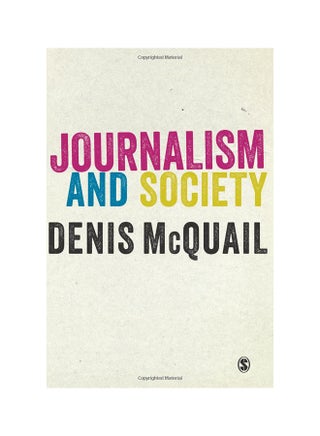| Editorial Review | Every serious student of journalism should read this book. Combining sophisticated analysis with an accessible writing style, Denis McQuail has succeeded in producing a work of scholarship that shows what journalists do and what they should do. Stephen Coleman. Professor of Political Communication, Institute of Communications Studies, University of Leeds. This luminous book sets a new standard for the textbook genre. Brilliant in contents, crystal-clear precision where every sentence counts, rigorous with ideas, it teaches the world mind. For a half century we have spoken earnestly of journalism's responsibility to society instead of to business and government. Now this concept is given sophistication unmatched, by the best scholar of media theory of his generation. Clifford Christians. University of Illinois. This is going to be a must-read in journalism and communication classes. McQuail quality as we know it. Christina Holtz-Bacha. University of Erlangen-Nuremberg. Journalism, as a profession, evolves, becoming increasingly complex and diverse. Especially now we need to be reminded where it came from, how it works, and where it stands in society. Denis McQuail provides the indispensable gateway. Mark Deuze. University of Amsterdam. At a time when the journalistic profession is fundamentally challenged by technological transformations and new business models, Denis McQuail reminds us of the continuing social and political relevance of journalism in and for democratic societies. The grand old man of communication theory presents an overarching social theory of journalism that goes beyond the usual Anglo-American focus and develops a truly global scope, reflecting both his own previous work as well as that of many others. The master of synthesis offers an excellent overview of the position and mission of journalism in an information society that opens up the field of journalism and journalism studies for both students and scholars. Jo Bardoel. Professor of Journalism and Media, University of Amsterdam (ASCoR) and Nijmegen, the Netherlands. In Journalism and Society Denis McQuail is at his best. He presents a very insightful revision of the sociological reflection on journalism and society, discussing the important implications of the new communication technologies for journalism of the 21st century. The declared aim of the book is to identify and describe the principles of journalism most widely recognized. McQuail goes well beyond, providing sound theoretical foundations of a new sociological paradigm of public communication in deeply transformed media and information environments. At the same time the book is a firm guide in the understanding of the principles of a profession that is a core activity of modern societies. A must-read book for students, academics and journalists. Gianpietro Mazzoleni. Professor of Sociology of Communication, University of Milan, Italy This book deals with the eternal question of how journalism is linked to society. Its nine chapters cover all pertinent aspects of journalism, including its freedom and responsibility, as well as issues such as the power of the press and the future of the press as an institution in the age of internet. All this is done with an analytical insight of the encyclopedic authority behind Mass Communication Theory. Also, pedagogically it is an exemplary textbook with each chapter including boxes to summarize the points, a conclusion to wind up, and selected further readings to support homework. I cannot think of a better staple food for students of journalism at all levels. Kaarle Nordenstreng Professor Emeritus of Journalism and Mass Communication, University of Tampere, Finland |
Free & Easy Returns
Best Deals

